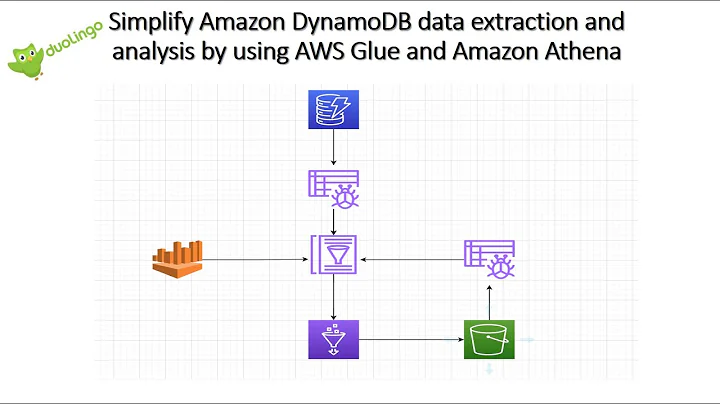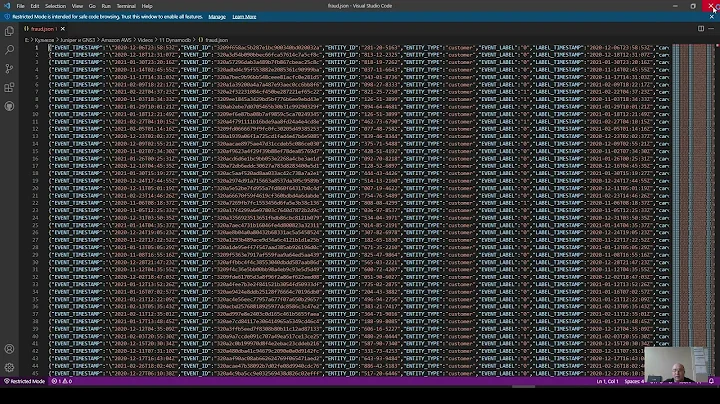How to simplify aws DynamoDB query JSON output from the command line?
Solution 1
You can decode the values recursively with a well crafted function. It looks like the key names correspond to a type:
S -> string
N -> number
M -> map
Handle each of the cases you want to decode if possible, otherwise filter it out. You can make use of the various type filters and the alternative operator to do so.
$ cat input.json
{
"Count": 1,
"Items": [
{
"Id": { "S": "app1" },
"Parameters": {
"M": {
"nfs#IP": { "S": "192.17.0.13" },
"maxCount": { "N": "1" },
"nfs#defaultPath": { "S": "/mnt/ebs/" }
}
}
}
],
"ScannedCount": 1,
"ConsumedCapacity": null
}
$ cat ~/.jq
def decode_ddb:
def _sprop($key): select(keys == [$key])[$key]; # single property objects only
((objects | { value: _sprop("S") }) # string (from string)
// (objects | { value: _sprop("B") }) # blob (from string)
// (objects | { value: _sprop("N") | tonumber }) # number (from string)
// (objects | { value: _sprop("BOOL") }) # boolean (from boolean)
// (objects | { value: _sprop("M") | map_values(decode_ddb) }) # map (from object)
// (objects | { value: _sprop("L") | map(decode_ddb) }) # list (from encoded array)
// (objects | { value: _sprop("SS") }) # string set (from string array)
// (objects | { value: _sprop("NS") | map(tonumber) }) # number set (from string array)
// (objects | { value: _sprop("BS") }) # blob set (from string array)
// (objects | { value: map_values(decode_ddb) }) # all other non-conforming objects
// (arrays | { value: map(decode_ddb) }) # all other non-conforming arrays
// { value: . }).value # everything else
;
$ jq 'decode_ddb' input.json
{
"Count": 1,
"Items": [
{
"Id": "app1",
"Parameters": {
"nfs#IP": "192.17.0.13",
"maxCount": 1,
"nfs#defaultPath": "/mnt/ebs/"
}
}
],
"ScannedCount": 1,
"ConsumedCapacity": null
}
Solution 2
Another way to achieve the post's goal would be to use a node.js extension like node-dynamodb or dynamodb-marshaler and build a node command line tool.
Interesting tutorial to build a node.js command line application with commander package: Creating Your First Node.js Command-line Application
Here's a quick and dirty oneliner that reads one record from stdin and prints it in simplified form:
node -e 'console.log(JSON.stringify(require("aws-sdk").DynamoDB.Converter.unmarshall(JSON.parse(require("fs").readFileSync(0, "utf-8")))))'
Related videos on Youtube
herve
Updated on December 14, 2021Comments
-
 herve over 2 years
herve over 2 yearsI'm working with The AWS Command Line Interface for DynamoDB.
When we query an item, we get a very detailed JSON output. You get something like this (it has been built from the
get-itemin order to be almost exhaustive (theNULLtype has been omitted) aws command line help:{ "Count": 1, "Items": [ { "Id": { "S": "app1" }, "Parameters": { "M": { "nfs": { "M": { "IP" : { "S" : "172.16.0.178" }, "defaultPath": { "S": "/mnt/ebs/" }, "key": { "B": "dGhpcyB0ZXh0IGlzIGJhc2U2NC1lbmNvZGVk" }, "activated": { "BOOL": true } } }, "ws" : { "M" : { "number" : { "N" : "5" }, "values" : { "L" : [ { "S" : "12253456346346"}, { "S" : "23452353463464"}, { "S" : "23523453461232"}, { "S" : "34645745675675"}, { "S" : "46456745757575"} ] } } } } }, "Oldtypes": { "typeSS" : {"SS" : ["foo", "bar", "baz"]}, "typeNS" : {"NS" : ["0", "1", "2", "3", "4", "5"]}, "typeBS" : {"BS" : ["VGVybWluYXRvcgo=", "VGVybWluYXRvciAyOiBKdWRnbWVudCBEYXkK", "VGVybWluYXRvciAzOiBSaXNlIG9mIHRoZSBNYWNoaW5lcwo=", "VGVybWluYXRvciA0OiBTYWx2YXRpb24K","VGVybWluYXRvciA1OiBHZW5lc2lzCg=="]} } } ], "ScannedCount": 1, "ConsumedCapacity": null }Is there any way to get a simpler output for the
Itemspart? Like this:{ "ConsumedCapacity": null, "Count": 1, "Items": [ { "Id": "app1", "Parameters": { "nfs": { "IP": "172.16.0.178", "activated": true, "defaultPath": "/mnt/ebs/", "key": "dGhpcyB0ZXh0IGlzIGJhc2U2NC1lbmNvZGVk" }, "ws": { "number": 5, "values": ["12253456346346","23452353463464","23523453461232","34645745675675","46456745757575"] } }, "Oldtypes": { "typeBS": ["VGVybWluYXRvcgo=", "VGVybWluYXRvciAyOiBKdWRnbWVudCBEYXkK", "VGVybWluYXRvciAzOiBSaXNlIG9mIHRoZSBNYWNoaW5lcwo=", "VGVybWluYXRvciA0OiBTYWx2YXRpb24K", "VGVybWluYXRvciA1OiBHZW5lc2lzCg=="], "typeNS": [0, 1, 2, 3, 4, 5], "typeSS": ["foo","bar","baz"] } } ], "ScannedCount": 1 }There is nothing helpful in the dynamodb - AWS CLI 1.7.10 documentation.
We must get the result from the command line. I'm willing to use other command line tools like
jqif necessary, but such ajqmapping appears to complicated to me.
Update 1:jqbased solution (with help from DanielH's answer)With
jqit is easy, but not quite pretty, you can do something like:$> aws dynamodb query --table-name ConfigCatalog --key-conditions '{ "Id" : {"AttributeValueList": [{"S":"app1"}], "ComparisonOperator": "EQ"}}' | jq -r '.Items[0].Parameters.M."nfs#IP".S'Result will be:
172.16.0.178The
jq-roption gives you a raw output.
Update 2:jqbased solution (with help from @jeff-mercado)Here is an updated and commented version of Jeff Mercado
jqfunction to unmarshall DynamoDB output. It will give you the expected output:$> cat unmarshal_dynamodb.jq def unmarshal_dynamodb: # DynamoDB string type (objects | .S) # DynamoDB blob type // (objects | .B) # DynamoDB number type // (objects | .N | strings | tonumber) # DynamoDB boolean type // (objects | .BOOL) # DynamoDB map type, recursion on each item // (objects | .M | objects | with_entries(.value |= unmarshal_dynamodb)) # DynamoDB list type, recursion on each item // (objects | .L | arrays | map(unmarshal_dynamodb)) # DynamoDB typed list type SS, string set // (objects | .SS | arrays | map(unmarshal_dynamodb)) # DynamoDB typed list type NS, number set // (objects | .NS | arrays | map(tonumber)) # DynamoDB typed list type BS, blob set // (objects | .BS | arrays | map(unmarshal_dynamodb)) # managing others DynamoDB output entries: "Count", "Items", "ScannedCount" and "ConsumedCapcity" // (objects | with_entries(.value |= unmarshal_dynamodb)) // (arrays | map(unmarshal_dynamodb)) # leaves values // . ; unmarshal_dynamodbIf you save the
DynamoDBquery output to a file, lets sayddb-query-result.json, you can execute to get desired result:$> jq -f unmarshal_dynamodb.jq ddb-query-result.json-
Jeff Mercado about 9 yearsHmm, so is it that the object's key names indicate their types? Like "S" is for strings, "M" is for maps, and "N" for numbers? You can actually do something really nice with that.
-
Dave Stern about 9 yearsYour
unmarshal_dynamodb.jqsolution is brilliant and credit goes to you & @JeffMercado. One flaw in using the//that I've been trying to resolve is that any filter that returns false doesn't get transformed. This matters with boolean values that are actually set to false - they keep theBOOLorBkey. I've added a line to partially resolve this, but still haven't found a way to fully fix it without a second pass:// (objects | if has("BOOL") or has("B") then [false] else null end)This addsfalseas a 1-element array and needs to go before the "# managing others..." line. -
Jeff Mercado over 6 years@DaveStern: I revised the method used here to properly handle falsy values. And should now have an overall cleaner implementation.
-
johnboiles over 4 yearsDef worth using @JeffMercado's answer below if you have BOOLs in your schema.
-
 Paul Fowler almost 3 yearsI don't usually comment, but really brilliant. Thank you!
Paul Fowler almost 3 yearsI don't usually comment, but really brilliant. Thank you! -
 juanes over 2 yearsThis is great! The only wrinkle is that it doesn't handle
juanes over 2 yearsThis is great! The only wrinkle is that it doesn't handlenull(or rather"NULL": true). I was able to fix that by adding this at the beginning:walk( if type == "object" and has("NULL") then . |= null else . end ) |
-
-
 herve about 9 yearswith
herve about 9 yearswithjqit is easy, but not quiet pretty, you can do something like:aws dynamodb query --table-name ConfigCatalog --key-conditions '{ "Id" : {"AttributeValueList": [{"S":"app1"}], "ComparisonOperator": "EQ"}}' | jq -r '.Items[0].Parameters.M."nfs#IP".S'result will be:172.16.0.178. See updated post. -
 herve about 9 yearsThanks to @jeff-mercado's help. I posted an extended version of his
herve about 9 yearsThanks to @jeff-mercado's help. I posted an extended version of hisdecode_ddb.jqfunction as an update of the original post.









